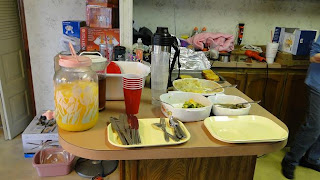 Physically and emotionally exhausted, I continued to pick up broken glass and pieces of shingles from 87-year-old Virginia Bennett's yard.
Physically and emotionally exhausted, I continued to pick up broken glass and pieces of shingles from 87-year-old Virginia Bennett's yard.She had been without a working toilet for three weeks and was waiting for a plumber when we knocked on her door. Flustered by the interruption, she seemed hard pressed to accept our offer to help. She had just received her noon meal from Meals on Wheels and wanted to finish it before it got cold, she knew a plumber was coming and now strangers were offering assistance.
Her home had received minor damage; her main concern was her small yard. Three weeks had passed since the tornado, no one had been by to cut the grass since then. She had young boys who were willing to cut the grass, but she was afraid they would be hurt by flying debris.
When asked for a rake, she couldn't remember if she had one; a member of our team was able to borrow two rakes from a neighbor and we began picking through the overgrown lawn. Members of our team worked in her small front yard picking up debris and sweeping the sidewalk while others worked in the back and side yards.
When we felt we had done all we could, we were greeted by Virginia who wanted to offer us drinks and snacks. She apologized for not having more, but insisted we take two small packages of pretzels. As several of us sat on coolers on her front porch (her refrigerator had ceased working) she thanked us repeatedly for our efforts and for the efforts of all the volunteers who had helped her and her hometown.
After several hours in the sun, I was tired and moving slowly. When we got back to the church, I had decided to lie down for a couple of hours before finding more work. I went upstairs, came back down to tell the girls where I would be, and found Allyson doodling an a piece of paper.
I started back up the stairs and before I made it to the air mattress, I turned around and walked back down the stairs. There was so much to do, and we had so little time left. I went out to the distribution tent to offer my assistance. Time passed quickly as I talked with people, helped them find food and toiletry items and then prayed with them.
Before we left Joplin, several of us talked about what had taken place. We talked about the devastation and the people who had poured their hearts out to us. When one of our church members cried and said she didn't want to go home because there was still so much to do, Pastor Chris gently reminded her that one person can make a difference, but one person can not do everything that needs to be done.
Tonight, I was thinking about how I felt when we first adopted the girls. I would rock them after hearing them cry out in their sleep, ("No!" "Don't!" and "Stop!" were common cries) and then I would cry realizing that while I was making a difference in the lives of two, there were so many children who were in abusive situations who wouldn't be spared a life of pain. The weight of those thoughts wore me down. At some point, it became clear to me that God had sent the girls to us. And, it became clear that He wasn't asking me to save the world, one child at a time. I was being asked to do the best I could with these two little girls, so that perhaps one day they could go out into the world and each could save two more.
I don't know what will happen, I don't know how God's Kingdom will be affected by the lives of Allyson and Kayleigh, but I do know that lives will be changed because of them.
In Joplin, we all experienced the need to do more. My hope is that each and every volunteer will come to the realization that their actions will make a difference. They have played an important role in furthering God's Kingdom and when they leave Joplin, or any other mission field, to come home, they can rest knowing they have done what they were called to do, and others will follow their lead.




